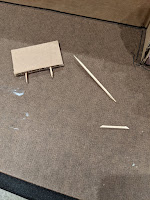Moathouse model updates
I’ve made some good progress! The basic structure is assembled. I’ve sealed off the corrugated edges to make it look better and give it some strength. I’m now working on the ceiling. Once that is done, I will create the rubble areas, then get to painting.
I’m really happy how this is turning out! It looks almost exactly like I hoped. It’s required some planning and experimentation, but it’s been pretty easy, overall. Just learning some new tricks, like how to use the hot glue gun, how to use toothpicks/cocktail-sticks to hold things down into the foam, how to fold cardboard and so on.
I did make one mistake though. In measuring out the dimensions, I forgot to take the width of the cardboard into account. So height-wise, this is to scale. The sizes of the internal hallways and rooms, and the width of some of the battlements won’t support figures that are mounted on one inch bases. Ugh! Oh well, it will still work. This is my first assembly with cardboard and there were bound to be some lessons learned.
Adventure Research updates
I’ve not done much research and plotting/planning since I’ve been working on the modeling. I did finally crack open a 1e book that I’ve had for awhile, but have never looked at – the “Greyhawk Adventures” book by James Ward. It was published in September of 1988, one of the last 1e publications before TSR released Advanced Dungeons & Dragons 2e.
It’s an interesting book. It has details on how gods/desses work their will on Oerth through the use of avatars, and it covers more information about the monsters and their ecology/organization. There is detailed information on some of the notable NPCs of Greyhawk as well as some locations and adventures to run. It also has 106 new spells from Bigby, Mordenkainen and others. (No Kellek though, dammit. LOL.
Unfortunately, as a book to help me prepare for my Hommlet adventure, it has absolutely nothing to offer. So, my next reads will be T1-4 Temple of Elemental Evil and the Greyhawk boxed set to see if there’s additional information.
Right now, my idea of the scenario looks like this:
- The players will divide up and oppose each other as the forces of Weal and Woe.
- First battle is the gathered militia of Hommlet marching upon the Moathouse to take care of bandits. They will find a bit more than just bandits there, as there will be also be a vanguard of Temple forces, commanded by Lareth. Battle takes place in/around moathouse.
- I have a feeling that #1 and #2 will take up our four hours BUT… if the players are focused and get through the first combat, then my second Act depends on who won the first.
If Woe won, then the second battle takes place at the outskirts of the village, as the Temple forces come to sack Hommlet!
If Weal won, then the second battle also takes place at the Moathouse, as the forces of Weal fortify it and prepare to hold against Woe.
Combat Mechanics
Over the past couple of weeks, I’ve been experimenting with an approach that is a hybrid of Chainmail and Book of War. Book of War is a fun skirmish game developed by Daniel Collins to be statistically compatible with OD&D and it’s underlying algorithm. I’ve used it in the one-on-one game I have with Angie (my wife) and it’s worked fairly well!
My approach is thus:
- For individual and mass combat, each troop will be identified as an attacking/defending type typical of Chainmail (Light Foot LF, Heavy Foot HF, Armored Foot AF). Each individual/troop will have a number of hits that they can sustain, a “To Hit” value (similar to AH from Book of War), a morale target and for individuals, a Fighting Capability value.
- Combat results will be adjudicated using the “Method 1” approach from Compleat Chainmail, which is the mass combat mechanic from Chainmail, with some changes.
- Instead of using the chart that dictates # of dice per individual (or # of figures required to attack the enemy), instead roll # of dice as applicable (# of figures in unit, fighting capability of individual). Match against the “To Hit” value of the target. Apply modifiers to roll if attacking as LF vs AF (or mounted), AF or mounted vs LF.
- If 1 or more individuals are attacking a troop unit, their Fighting Capability (FC) must be eight (8) or greater.
- If attacking a Fantasy Creature, the various qualifications/requirements and rules apply about who can attack whom and how. Creatures will have type designation, TH value and FC value assigned, as well as characteristics unique to that creature.
- I’m going to use the simple Complete Chainmail morale rule (single value for unit) for two specific instances and modifiers appropriate (first casualty, 50% or more casualties).











Looks very cool, and a good bit of work! T1 should be helpful, not so sure about the rest of T1-4, though. Good luck!
Thanks Alan! We'll see what T1-4 says about the forces around Nulb and the Temple for the second attack.
This looks like it's going to be a lot of fun! Maybe one of these years I'll actually get to GaryCon…
Michael! It looks great. Looking forward to see the Chicago Wiz at Gary Con. (This is Dave and I think we met at the 13 Warrior game a couple of years back.)
That was a fun game! "Lo there do I see my father…"